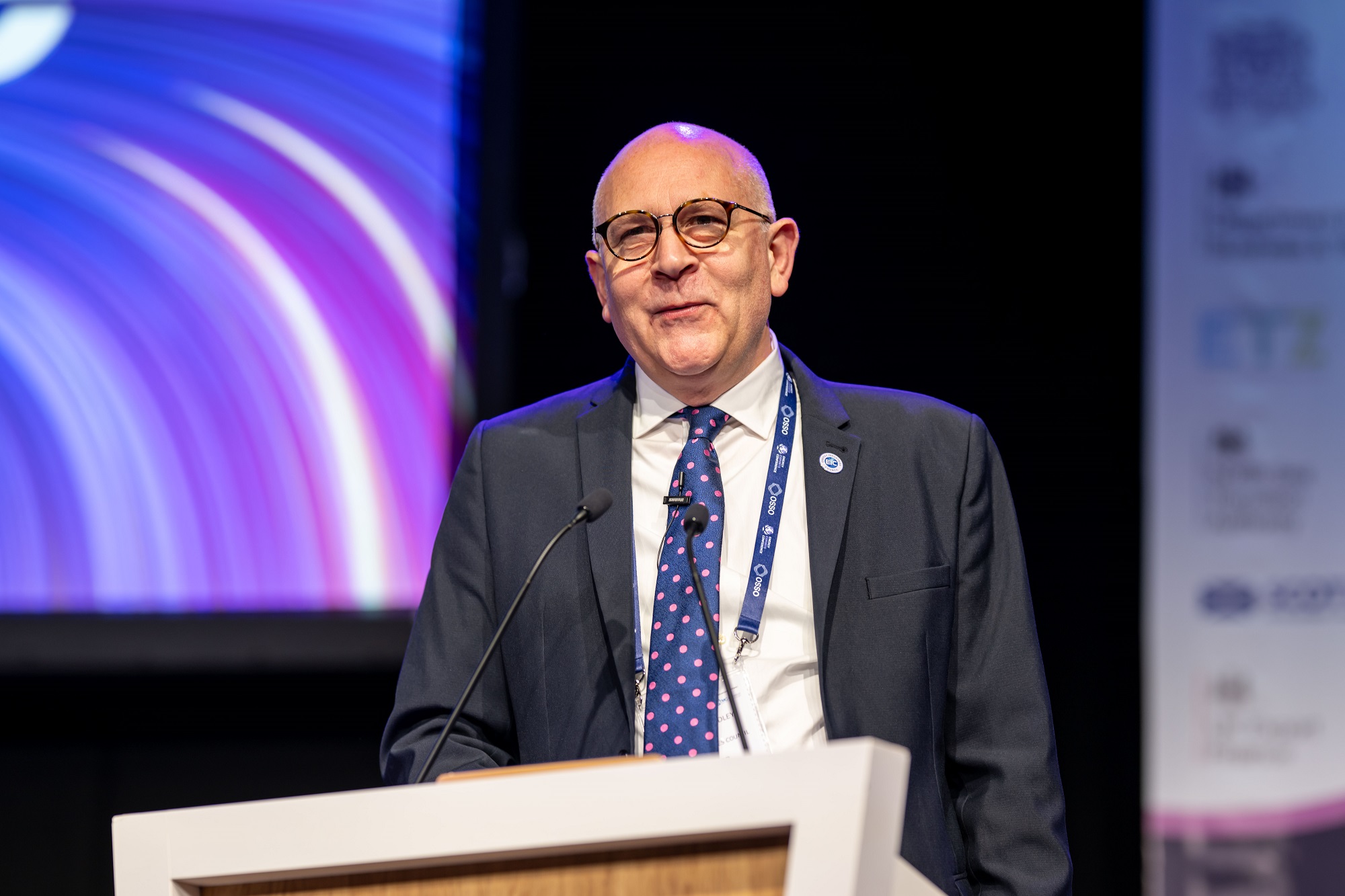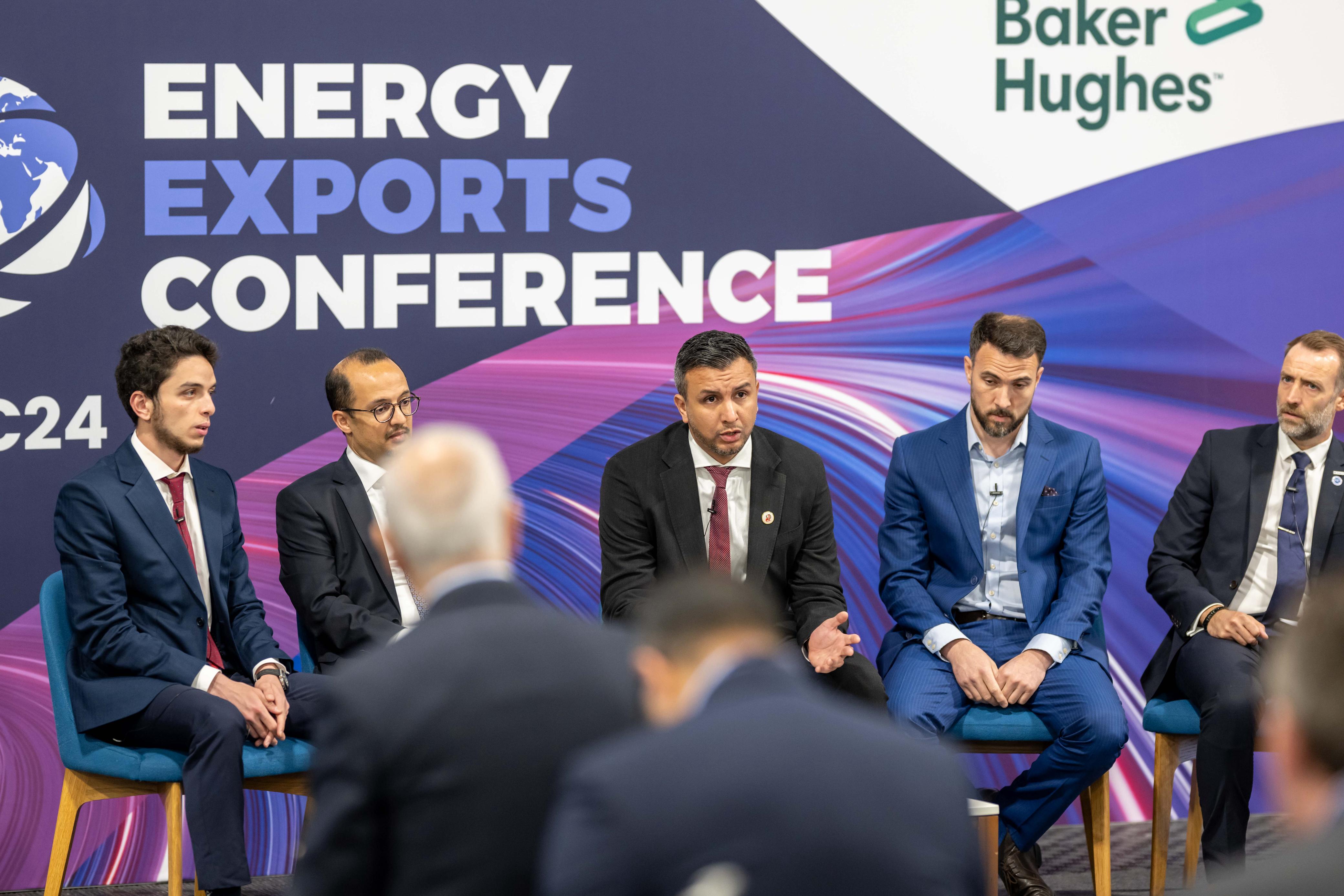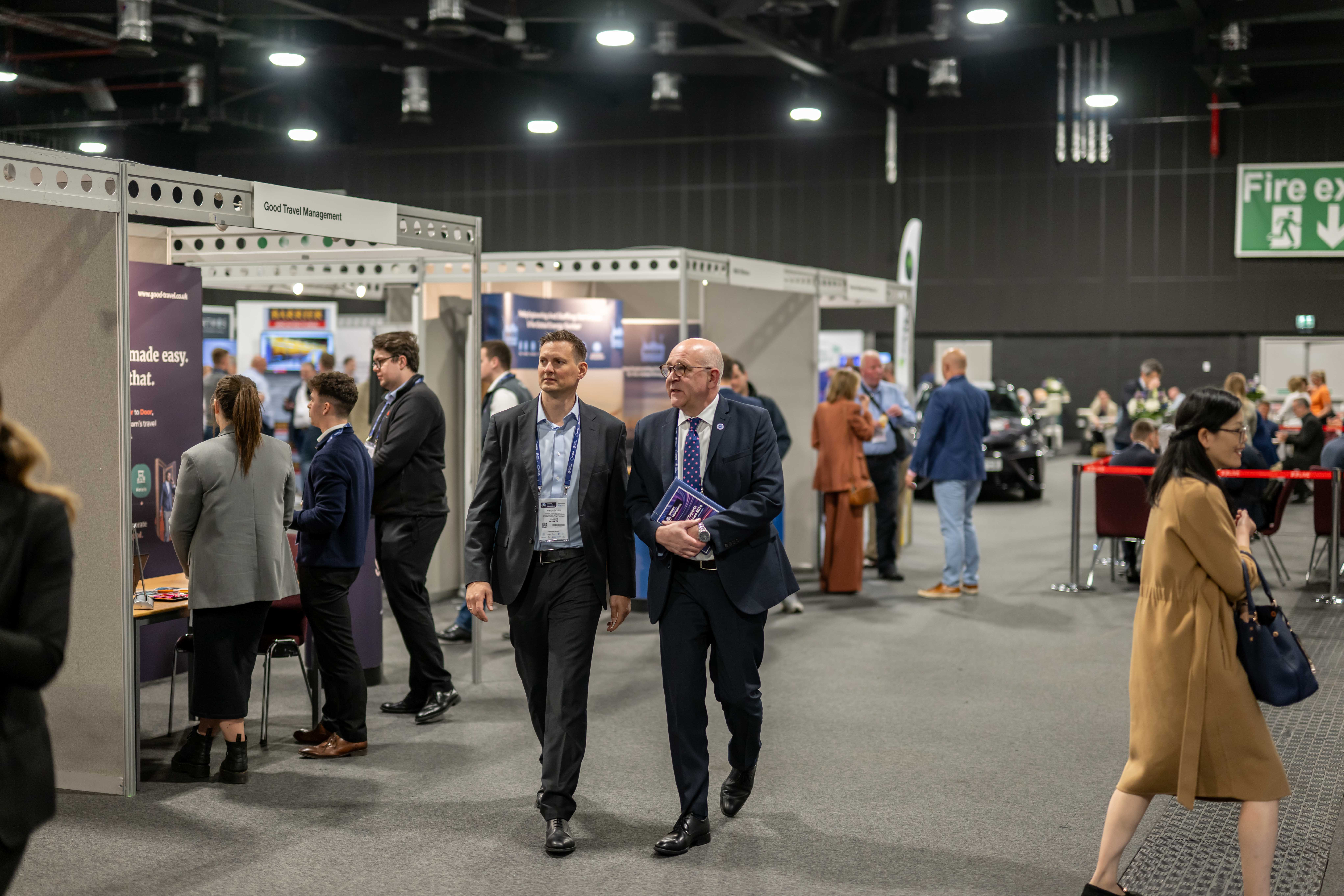The EIC's flagship event, The Energy Exports Conference 2024, concluded this week. The conference and exhibition provided supply chain businesses with opportunities to connect with each other and with major operators, including Aramco, which hosted a series of one-to-one meetings with conference participants. The conference was also a platform for sharing significant insights on multiple key topics, including green financing, the future of a sustainable oil and gas industry, and hydrogen and carbon capture technologies and projects. Speakers and country delegations came from 20 countries, including Brazil, Greece, Libya, and Turkey.

What follows is a series of LinkedIn posts we shared during the event, giving you an idea of some of the topics discussed:
Energy Exports Conference 2024, Day Two: Financing the Energy Transition Session
EEC 2024 concluded its second day with another insightful round of sessions and discussions, but we wanted to leave you with this key takeaway from a session dedicated to financing the energy transition, which is that funding for energy transition projects and initiatives is available, and banks are happy to provide funding to the right projects. But energy companies, including supply chain businesses, are encouraged to have solid financial records and thoroughly risk-assessed projects to secure financing.
Moderated by EIC's Rebecca Groundwater, this session focused on the critical aspects of financing the energy transition. Speakers shared insights on risk management, bankability, and the challenges faced by SMEs in the renewable energy sector.
Ian Headley of Santander elaborated on the critical issue of bankability in energy transition financing. He said there is significant capital available for green projects, but a challenge lies in ensuring that projects are bankable. This involves a clear allocation of risk among all stakeholders involved in a project. Santander, being the number one renewables lender in Europe, has targeted raising and facilitating €120 billion in green finance by 2025, he said.
Dr Kerry-Ann Adamson of Worley discussed the increasing risk EPC firms are expected to take on and the need for insurance companies to share this risk. She noted a push in Europe for locally produced components, like electrolysers, and the need for hydrogen projects to be bankable. Adamson highlighted the necessity for the sector to learn to communicate in financial terms (rather than in the language of engineers) to gain investor confidence.
Ann Johnson from Blaze Manufacturing Solutions, part of the Balmoral Group, expressed frustration over the lack of government support for SMEs transitioning to renewables. She noted the difficulties faced by privately-owned businesses in surviving without consistent governmental backing, while reiterating the commitment to the energy transition.
EIC's Fleur Pomeroy pointed out the risk of losing trust in transition projects and the importance of building on existing skills rather than creating a completely new supply chain.
Energy Exports Conference 2024, A View from the Top, Equinor Interview
EEC 2024's concluded featured a key interview with Arne Gurtner from Equinor, conducted by Stuart Broadley, CEO of the Energy Industries Council (EIC). Key points discussed included the importance of local business collaboration, the UK’s energy landscape, and the global energy transition.
Arne Gurtner praised the UK as an excellent place for diverse energy investments, highlighting Equinor's activities in oil and gas, wind farms, carbon capture, hydrogen, and recent investments in energy storage. Gurtner said that Equinor is replicating the UK model in other parts of Europe and now in Brazil, where they have acquired a company called Rio Energy to expand into PV solar.
He pointed out that while the UK has achieved significant milestones in cutting coal targets and expanding wind energy, there are concerns about the speed of energy investments. He said that global capital flows to the best opportunities, not specific countries, and expressed concern over the lengthy processes in highly regulated markets like the UK. Gurtner stressed the need for long-term predictability and urged political stakeholders to ensure stable and predictable policies.
He commended the strength of the UK supply chain, noting that 80% of it can transition from oil and gas to new energy sectors. However, Gurtner warned that new jobs need to be created before eroding existing ones to ensure a smooth transition.
Gurtner discussed the differing approaches to energy transition across countries, based on their unique starting points. He observed that while Europe tends to have government-driven planning, market-based approaches in other regions may be more effective in addressing energy transition challenges.
On a global scale, Gurtner noted that there has been significant investment in clean energy, but the transition has not yet truly begun. In his words: "Have we started transition? We have changed energy addition" through cleantech projects, "and have yet to start transition."

Offshore Wind Session Overview: Energy Exports Conference 2024, Day Two
Today's offshore wind session at the Energy Exports Conference 2024 focused on the current state and future prospects of the offshore wind sector. Key topics included the need for regulatory action, the challenges facing the supply chain, and the importance of strategic investment and collaboration.
EIC's Sharanya Kumaramurthy said there is a short-term tendency among many companies to favour oil and gas due to existing headwinds in renewables. She pointed out that achieving wind targets (270 gigawatt globally, excluding China) by 2030 seems unlikely but stressed that were still significant opportunities in the sector. She called for less focus on targets and more on actionable steps, including regulatory measures.
Venterra's Jamie MacDonald provided an overview of the fixed bottom offshore wind market, noting significant challenges over the past 18 months such as rising costs, supply chain bottlenecks, regulatory issues, and technical reliability concerns. He said there was a need for strategic adjustments and increased investment to ensure growth and competitiveness. MacDonald discussed the industry's move towards larger wind turbines and deeper water installations, highlighting the limited global capacity for producing the necessary large monopiles outside of China. He said that creating a sustainable offshore wind market requires a collaborative approach across the industry, with a focus on long-term value rather than merely cutting costs.
Darren Taylor, of Bureau Veritas spoke about the necessity of standardising within the offshore wind industry. He noted that the supply chain needs to invest in larger and better facilities, but there must be a point of standardisation. He said there was a lack of sufficient vessels and fabrication infrastructure to support the number of projects underway wind . Taylor stressed the importance of managing quality at every stage of the supply chain to avoid high costs. He also mentioned the increasing importance of boosting domestic production to diversify supply chains and improve reliability.
Energy Exports Conference 2024: Day One Summary
The first day of the Energy Exports Conference 2024 in Aberdeen included a series of informative sessions and discussions on various aspects of the energy industry, including carbon capture, offshore wind, hydrogen, and oil and gas.
Several speakers made it clear that while global demand for oil and gas is expected to continue over the coming decades, the production and use of fossil fuels must be carried out with minimal environmental impact. This can be achieved through decarbonisation technologies, including electrification and carbon capture, without jeopardising global net zero commitments.
There was a consensus that cleantech requires action on two main fronts: funding and the pace of executing and upscaling projects.

Hydrogen Session: Ambition Versus Reality
The hydrogen session highlighted the gap between ambition and reality, especially concerning funding challenges. They also stressed on the need for close collaboration and data-sharing among industry players on one side and the industry and government on the other.
CCUS Session: Scaling and Cost Efficiency
Speakers said that given that carbon capture, utilisation and storage (CCUS) projects are not normally profit-making, there was a need for reducing costs through increased scale coupled with incentives and regulations to guide investment decisions.
Wind Session: US Offshore Opportunities and Political Dynamics
The wind session focused on US offshore wind opportunities, discussing the importance of political support and collaboration among agencies. Speakers noted that the upcoming US elections could affect the Inflation Reduction Act (IRA) but pointed out that state-driven initiatives have historically led the way, regardless of federal politics. They stressed the need for long-term policies.
Aramco’s Engagement with Supply Chain Businesses
Executives from Aramco and Saudi Arabia’s Ministry of Energy and other entities presented opportunities for supply chain businesses to engage with Aramco. Khalid Alassaf outlined the benefits of Saudi Arabia's economic diversification. Key topics included low-rate financing opportunities from the Saudi Industrial Development Fund (SIDF), investment opportunities in Saudi Arabia, and Aramco’s extensive capital investment programmes. Aramco is also conducting one-on-one meetings with supply chain companies to facilitate global exports.
Opening Session: Balancing Oil, Gas, and Clean Energy
The opening session featured remarks from Stuart Broadley, CEO of the EIC, who spoke about the need for a global mindset to develop international markets. The session included discussions on the ongoing role of oil and gas in the energy mix, responsible extraction through decarbonisation technologies, and the importance of investment and collaboration to accelerate clean energy projects.
Aramco Conducts a Series of Presentations at the Energy Exports Conference
Executives and officials from Aramco, Saudi Arabia’s Ministry of Investment (MISA), and other entities conducted a series of presentations on the first day of the Energy Exports Conference 2024 in Aberdeen. These presentations provided a rare glimpse into how supply chain businesses can engage with Aramco. For the second year in a row, EEC offers this direct engagement opportunity for its delegates with Aramco.
The EEC, the UK’s foremost energy supply chain exports conference, features delegations and speakers from 20 countries across the globe.
The presentations began with opening remarks by Khalid Alassaf, Vice President of the Procurement & Supply Chain Management Department at Aramco Europe. He invited companies to take advantage of emerging opportunities across the company’s operational ecosystem.
Key topics covered in the presentations included:
Utilising low-rate financing opportunities offered by the Saudi Industrial Development Fund (SIDF).
The process for registering and qualifying as an Aramco supplier, regardless of the company's registration location.
Investment opportunities in Saudi Arabia.
Aramco’s capital investment programmes, which include numerous projects (including mega projects) set to roll out in the coming years. These projects offer extensive opportunities for supply chain businesses in processing programmes, refining facilities, offshore projects, distribution, infrastructure, and mega petrochemical projects.
Aramco is also conducting one-on-one meetings with supply chain companies at EEC 2024, an event that aims to help businesses develop and grow their global exports.
Chris Behan, Location Lead at Worley Share Insights on Growing Markets
In a conversation with Stuart Broadley, CEO of the Energy Industries Council (EIC), at the Energy Exports Conference 2024, Chris Behan, Location Lead at Worley, observed significant year-on-year growth in the US market and a substantial ramp-up of activity. The Middle East market remains strong, stable, and growing, with less impact from policy and government changes, he said, adding that there is hope for similar trends in Europe. However, geopolitical factors and numerous elections this year present challenges, Behan said.
Behan pointed out that it is important to follow macro trends, which indicate growth in the US, Middle East, and Europe.
He also spoke of the need for skills transfer, particularly in carbon capture utilisation and storage (CCUS) and hydrogen. Many professionals working on North Sea assets, he said, are now involved in CCUS technology, which shows the transferability of skills as an essential part of both engineering and construction phases to avoid bottlenecks.

The Energy Exports Conference Opens in Aberdeen
The Energy Exports Conference 2024 began this morning in Aberdeen at P&J Live with lively discussions about the future of the energy industry, including how oil and gas can continue to play a role in the energy mix without jeopardising global net-zero targets.
In his opening remarks, Stuart Broadley, CEO of the Energy Industries Council (EIC), addressed the decreasing profitability in oil, gas, and other sectors. Importantly, he spoke of the need for a global mindset to develop new international markets. “We bring some of the best projects in the world, as well as decision-makers, to the EEC,” he said. “This is ultimately an event to encourage more business, more deals.”
In the first session, "From Vision to Victory: Leaders Shaping the Energy Industry," speakers from the British Chambers of Commerce, Wood, SLB, Siemens Energy, and Baker Hughes discussed the importance of continuing support for oil and gas while ensuring responsible extraction through decarbonisation technologies and accelerating clean energy projects, which require investment and collaboration from all stakeholders.